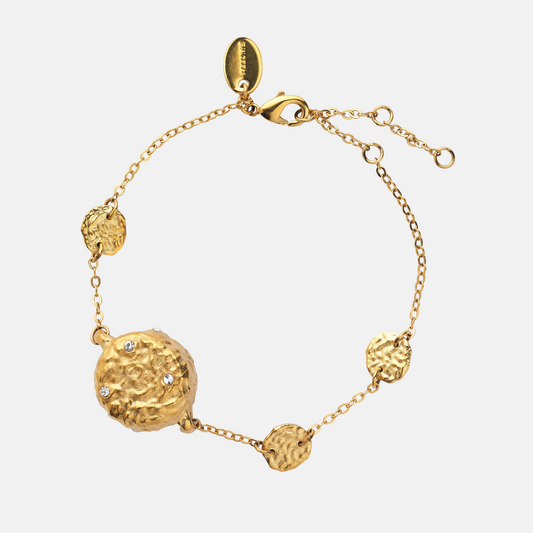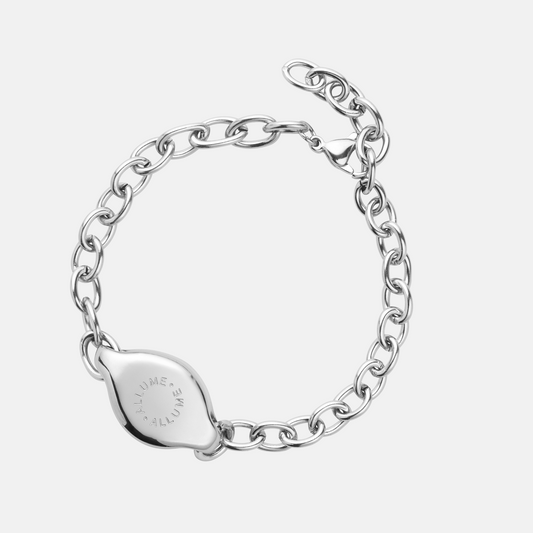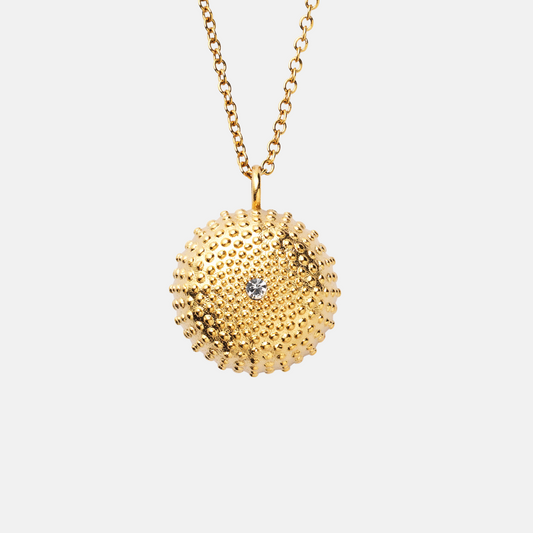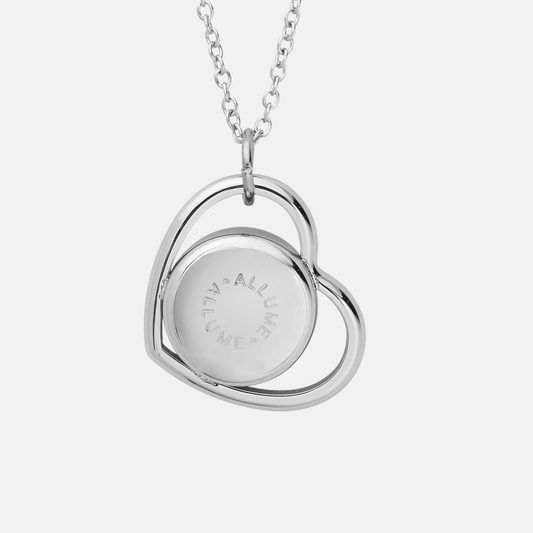By: Carsten Terp
Posted: 21. april 2025
Media: Impact Insider
When Dorte Caroline Knudsen turned 40, she decided to become a social entrepreneur. Now her company, all.u.me, is launching a piece of jewelry and an app that will make safety a shared responsibility – and start a conversation about culture, harassment and freedom.
It's late and you're on your way home. You turn up the music in your headphones a little, but take one earplug out – just to be safe. The keys are ready in hand. In case someone were to follow you. No one does. But it feels that way.
The scene is reality for far too many – especially women, who feel compelled to build safety-creating measures into their daily routine.
But what if security was a shared responsibility? Something we share with each other?
"The perceived fear is far too great in the anxious world we live in," says Dorte Caroline Knudsen:
"We want to make safety something we create together. And if we can do that, then we can also start talking about the norms, actions and habits that cause insecurity to arise."
Security in a piece of tech jewelry
Dorte is the founder of all.u.me – a startup that combines technology, design and active citizenship in a small wearable – a piece of jewelry that you can press if you feel insecure.
Three taps and a signal is sent to the app's network of nearby volunteers. Those who have agreed to be available will receive a message: There is someone nearby who needs you.
At the same time, the wearers of the jewelery receive an automated call, which they can use as an excuse to move out of the unsafe situation.
Now just do what you want. Go where you want. Wear what you want. And say what you want.
Dorte Caroline Knudsen, founder, all.u.me
2500 jewelery boxes have just arrived at Dorte's store on Frederiksberg Allé.
In May, her jewelery will be available in stores – online, in the app and in the store. Initially in four styles, which Dorte herself has designed together with Jonas, who is a jewelery designer and studies at KEA.
But it is not Dorte's ambition to build a jewelery brand. She just wants to deliver the security technology.
"We have created a collection to show what can be done - but mostly to say: 'Hey, Maria Black or Ganni, don't you want to make your own version?'," says Dorte.
A collaboration shows that the brand takes the problem seriously and sincerely wants to focus on shared responsibility, she points out:
"They will be able to buy our technology and then be responsible for the sales themselves in their own channels. We see a strong scaling potential in this business model," says Dorte, adding:
"For my sake, they can sell the jewelry as expensive as they want. If Gucci puts diamonds and everything on it, then they can sell it for 50,000. For me, it's about being able to sell the jewelry to their customer segment."

From global goals to reality
The idea for all.u.me began in a summer house.
After many years of working with tech and product development at IBM and Agillic, Dorte needed to set new goals for himself.
"The first 40 years of my life were about getting and creating. And on the other side of those 40, I felt a desire to give instead. Both as a super-privileged person, but also just generally to think that what you do should make sense," she says.
In a presentation, the former TV host Vibeke Hartkorn had said that if you lacked a problem to work on, you could read the UN's Global Goals. So Dorte had taken a printout of the world goals with her to the summer house.
"And it was around goal 5 - equality - that I was moved. Especially by the part that deals with violence and harassment against women, which I think is so horribly limiting all over the world. Then I knew that this was what I had to work with," she says.
"I don't think people are going to press the piece of jewelry 100 times. But better once too much than once too little," says Dorte Caroline Knudsen.
A quick Google search for "assault alarm" turned up a horror network of ugly plastic gizmos that women wouldn't go with - and that didn't try to change the culture behind the insecurity, just normalize it.
"My first thought was: It must be small. It must be beautiful. And then it must really change something," says Dorte.
Jacob jumped on the bike
The inspiration for all.u.me comes, among other things, from Hjerteløberne – a nationwide effort based on more than 160,000 volunteers being alerted via an app when a cardiac arrest occurs near them. This allows them to arrive quickly and provide life-saving first aid before the ambulance arrives.
In the same way, the wearers of Dorte's jewelery can notify up to 20 volunteers nearby. And the first five who accept the call are guided to the wearer's location.
Right now, 80 women are testing the jewelry, and there are several hundred volunteers on the app. Only once over the past four months has the alarm been activated, says Dorte.
"I don't think people will press the jewelery 100 times. But better once too much than once too little - and preferably as early as possible, so that there is time for the volunteers on the app to arrive before the situation escalates," she says.
Incidentally, it was a slip when the alarm was triggered, says Dorte.
"We have had Jacob, who hopped on his bike on Vesterbrogade and drove to an apartment and asked if there was anyone called Clara."
It was there. But she was a little surprised when Jacob stood outside the door.
"She was at a party and maybe a little tipsy. But she was enormously moved. And Jacob was just happy that Clara was doing well," says Dorte and adds:
“So we know, technically, that it works.”
Young women feel unsafe
For Dorte, the jewelery is only the first step. All.u.me is not just about giving people a tool in an unsafe situation – it's about changing the culture around harassment and violence.
Everyone who has downloaded the app is trained in the method The 5 D's – a strategy to intervene safely and effectively and without exposing oneself to risk.
This is where the real impact lies, points out Dorte.
"The primary reason people are passive is that they don't know how to act safely and effectively. They think they have to argue or fight and put themselves in danger. And that's why they don't act," she says.
According to the Safety Survey 2021 from TrygFonden and the Crime Prevention Council, only 62 percent of young women between the ages of 18 and 29 feel safe when they are out and about after dark.
In comparison, this applies to 85 percent of men in the same age group. And although Denmark is overall one of the safest countries in the world, the survey shows that the fear of violence and harassment still limits many women's everyday lives.
"I am so happy when one of the women who tests the jewelery comes and says that she does more of what she wants to do: 'I run where I want to run. I stop thinking some of these thoughts that I have all the time. Because I know that I have the jewelery with me,'" says Dorte.
The jewelry should start conversations
At the same time, the piece of jewelry becomes an opportunity to have conversations about the insecurity that limits, not least, women's freedom to be themselves.
"When Louise, aged 17, wants one of our pieces of jewellery, she can have the conversation with her parents about the fact that she actually had an unpleasant experience on the bus. And that way we can get a dialogue going," says Dorte.
She imagines that the dialogue can be spread to the boys' groups and to the lunchtime conversations at the workplace.
"When a friend makes a bad comment or teases a girl, the cool boy will say: "Stop it. It's actually not very nice for her," says Dorte.
"And at the workplace you might be able to say no to your colleague's jokes about the blonde with the big ass. Because they think everyone is really embarrassing."
In the long term, the goal is to give women and everyone else who feels vulnerable the freedom to be themselves.
"Just do what you want. Go where you want. Wear what you want. And say what you want. And should an unpleasant situation arise, press the piece of jewelry and get help to get out of the situation," says Dorte.
Global ambitions
The ambition extends far beyond Denmark's borders.
The combination of a physical piece of jewelery and a scalable technology means that all.u.me is just as useful in Kampala as in Copenhagen.
"It's not just women in Western countries who should benefit from this. It should apply to women all over the world. They also have mobile phones and wear jewellery," says Dorte.
She imagines that the jewelery can be produced in designs that suit local aesthetics and culture, and that they can be spread both through corporate collaborations and partnerships with NGOs.
For Dorte, all.u.me is a promise of a future where no one has to walk with the keys in their hands and their hearts in their throats.
"Run, think, create, travel, kiss, love, talk, dance. Do what you want," says Dorte Caroline Knudsen.
Read the article (In Danish)






